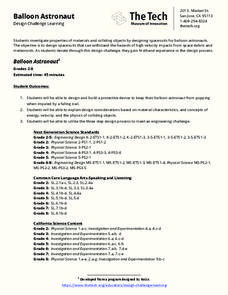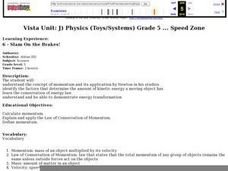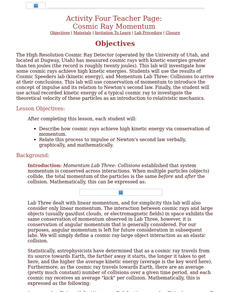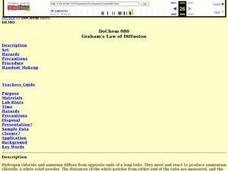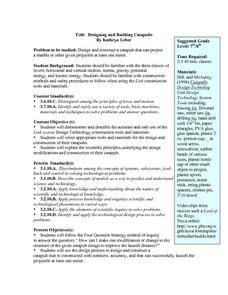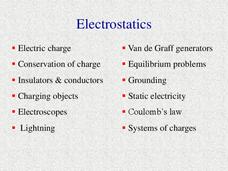Curated OER
Falling Water
Students drop water from different heights to demonstrate the conversion of water's potential energy to kinetic energy. They see how varying the height from which water is dropped affects the splash size. In seeing how falling water can...
Curated OER
Cosmic Rays
Students study cosmic rays and the energy behind them. For this atmospheric lesson students complete a cosmic ray telescope project.
Curated OER
Kinetics of acetone iodination
In this chemistry worksheet, students examine the given concept in order to apply in the laboratory setting. The sheet includes in depth background information.
Cornell University
Friction
Friction and gravity are always at odds! Learners complete a set of activities to explore the relationship between friction and gravity. Groups make conclusions about the factors that affect the amount and type of friction between surfaces.
Tech Museum of Innovation
Balloon Astronaut
Design protection from high-speed particles. The STEM lesson plan highlights why astronauts need protection from space debris. Pupils use the design process to design, build, and test a spacesuit that will protect a balloon from a...
Curated OER
Heat: Mini Unit
Students experiment with heat. In this physical science lesson plan, students engage in hands-on activities to develop concepts related to heat. Students offer explanations for their observations using given vocabulary.
Curated OER
Determining Momentum and Energy Loss of Balls Colliding Against Different Surfaces
Young scholars experiment with the bounce of balls on various surfaces. In this physics lesson, students use various surfaces to bounce balls to study the momentum. This hands-on activity with the concepts of elasticity of surfaces which...
Virginia Department of Education
Mystery Iron Ions
Young chemists perform an experiment to determine if a compound is iron (II) chloride or iron (III) chloride. Then they determine the formula, balance the equation, and answer analysis questions.
Curated OER
What is Temperature?
Students examine how temperature is the measure of the average kinetic energy of the molecules of a substance.
Curated OER
Sports and Science
Using footballs, basketballs, tennis balls, and more, learners conduct experiments to illustrate Newton's Laws of Motion. The experiments are conducted outside, and require them to throw, kick, and hit a variety of balls. Your class...
Curated OER
Slam On the Brakes!
Fifth graders study the concept of momentum and its application by Newton in his studies. They view a demonstration and complete an experiment with toy cars on a racetrack that shows them the properties of momentum and how velocity and...
Curated OER
Force And Motion
Eighth graders investigate the concept of force and motion while conducting short class activities. They compare the differences of potential and kinetic energy while rolling objects on a ramp. Students also measure the distance that...
Curated OER
Water Pressure Blaster
Third graders complete an experiment to introduce them to the concept of water pressure. In this water pressure lesson plan, 3rd graders create pressure in a water bottle and observe the force of water that is created.
Curated OER
Inquiry into Consumer Products
Students recognize different consumer products, found in and around the home, that have reactive or denaturing properties when used together. They explore chemical and physical properties of each product by identifying chemical formulas...
Curated OER
Science and Measurement
A great start to activate thinking about the scientific method, instruments, measurements, accuracy, constants and laws. Each slide describes important procedures and examples essential for the study of science.
Curated OER
An Introduction to Thermal Spray Technology
Young scholars discuss difference between kinetic and thermal energy, develop and demonstrate understanding of key concepts and characteristics underlying thermal spray techniques, list items used in their daily lives that are coated,...
Curated OER
Cosmic Ray Momentum
Students describe how cosmic rays achieve high kinetic energy via conservation of momentum.
Curated OER
Absolute Zero Lab
In this absolute zero worksheet, students experiment with a closed-end syringe and a ice bath and boiling water. They record volumes of gases in the syringe as well as temperatures of the water and they plot their experimental data. They...
Curated OER
Mousetrap Cars
Use mousetrap cars to make hands on connections with concepts such as energy, friction, momentum, and simple machines.
Curated OER
Impact Craters: Holes in the Ground!
Students simulate crater formation through a lab activity. In this space science lesson, students calculate how much energy is transferred during meteorite impact. They identify different factors affecting the size and depth of craters...
Curated OER
Graham's Law Of Diffusion
High schoolers demonstrate Graham's Law by observing a gaseous diffusion. After a lecture/demo, students perform an experiment then complete a write up activity which is imbedded in this plan to reinforce what they have observed during...
Curated OER
Designing and Building Catapults
Seventh graders complete a challenge to create a catapult that projects a marble or other projectile at least one meter. While experimenting they apply the Four Question Strategy to answer the question, " How can I make one modification...
Curated OER
What is Temperature?
Students study the effects of temperature and air expansion. In this temperature lesson, students discuss temperature and participate in a role play of low energy and high energy molecules. Students then discuss their activity and...
Urbana School District
Electrostatics
Why did lightning shock the man? Because it didn't know how to conduct itself. Presentation covers electric charges, insulators, conductors, electroscopes, lightning, generators, grounding, static electricity, and more. Presentation is...






